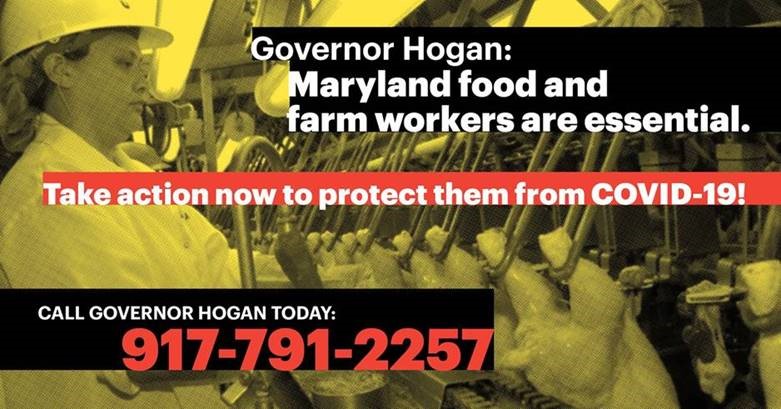
September 30, 2020
Businesses should protect essential food and farm workers from COVID-19, yet many deny their workforce basic health and safety protections. These Marylanders perform essential work, yet when they or their family members get sick, they are often denied basic employment benefits, such as health insurance, sick leave, and unemployment insurance. Call Governor Hogan today and urge him to pass an executive order instituting and enforcing strong COVID-19 protections for vulnerable farm, seafood, and poultry workers.
Take Action: Call 917-791-2257 to reach Governor Hogan’s office.
Sample Script:
Hello, I’m calling from (your city/town). I urge you to pass an emergency executive order mandating and enforcing strong COVID-19 protections for Maryland’s farm, seafood, and poultry workers. Essential workers in our agricultural industries are highly vulnerable to the virus – and many of their employers do not provide basic employment benefits, such as health insurance, sick leave, and unemployment insurance. I urge you to take immediate executive action to protect the essential workers who provide our food.
Background:
We must protect the workers who produce our food!
In the midst of a deadly pandemic, essential workers in Maryland’s agricultural and poultry industries have been forced to work in close quarters and denied adequate personal protective gear.
Thousands of migrant workers come to Maryland each year to perform essential work that puts food on our tables. They often live in overcrowded housing and travel to work side by side in buses and vans. Some employer-provided housing lacks potable water, adequate bathing facilities, and even soap.
Similarly, poultry processing workers labor in damp, cold, and poorly ventilated plants. Fast line speeds force workers to labor in close range as chickens quickly pass by. Workers are unable to take needed breaks, and reports of workers wearing adult diapers to get them through shifts are both shocking and revealing of an industry that does not take worker health seriously. At least 570 of these essential Maryland workers have tested positive for COVID-19, and at least six have died as of August. This is likely an undercount because neither the meatpacking companies nor the state have adequately disclosed COVID-19 cases from this industry to the public.
Most agricultural and meat processing employers do not provide workers with basic employment benefits, such as health insurance, sick leave, and unemployment insurance. Workers who become sick or have to care for a sick relative do not have paid leave to allow them to care for themselves or their loved ones. As migrant and immigrant workers, they support extended families here and abroad on poverty wages and the consequences of missing a day of work due to illness are substantial. Workers, including those on H-2A and H-2B temporary work visas, are hesitant to come forward with complaints about their work sites because they fear they will be terminated or some other type of retaliation. The lack of protections coupled with retaliation forces workers to work in silence.
Language barriers and lack of transportation are obstacles for many food and farm workers when they try to access testing for COVID-19. And, too often, the results are delayed.
The federal Occupational Health and Safety Administration under the Trump Administration has failed to act to protect workers. However, several states, including Virginia, have issued emergency regulations to address the high-risk conditions in agricultural and meat processing facilities and labor camps to help prevent the spread of COVID-19 among employees and their families. As opposed to recommendations or voluntary guidelines, these regulations require employers to implement protective measures at the worksite, and in employer-provided housing and transportation. We urge Maryland to follow suit.
Maryland must take immediate action to prevent further spread of COVID-19 in our poultry and seafood processing plants, among farmworkers across the state, and surrounding communities.



